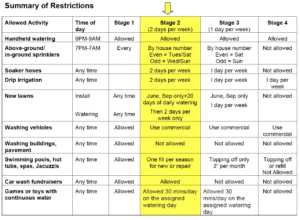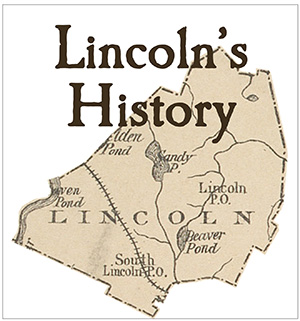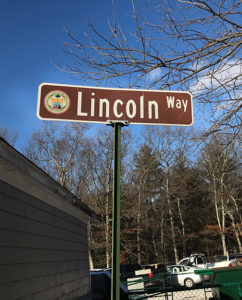 The article headlined “Accessory apartment issue results in razor-thin votes” incorrectly stated that the first amendment to the accessory apartment motion was made jointly by Sara Mattes and John Carr. The amendment was in fact submitted by Mattes alone. The article has been updated to reflect this correction.
The article headlined “Accessory apartment issue results in razor-thin votes” incorrectly stated that the first amendment to the accessory apartment motion was made jointly by Sara Mattes and John Carr. The amendment was in fact submitted by Mattes alone. The article has been updated to reflect this correction.
News acorns
 Eighth-grade car wash on Saturday
Eighth-grade car wash on Saturday
To benefit their upcoming graduation, the Lincoln School’s eighth-graders will host a car wash on Saturday, May 22 from 11 a.m.–5 p.m. at Town Hall (rain date: May 23). Since the class can’t have dances or bake sales, this is an important end-of-year activity for them. Click here to prepay for a car wash ($20) and/or make a donation. You may also pay in case on the day of the car wash. Names of those who preregister will be on a list that the students can check off when cars arrive.
“Kibbles and Nibbles” online cooking class
Lincoln-based nonprofit Phinney’s is launching “Kibbles and Nibbles,” an online cooking class, hosted by Cordon Bleu pastry chef Mika McDonald, on Sunday, May 23 from 7–8 p.m. on Google Meet. She will guide attendees in creating oat cake and Parmesan cheese crisps that can be both enjoyed by pets and people so those watching can follow and cook alongside her. A minimum donation of $10 secures a spot in the class, which has limited space and is designed for all ages and experience levels. To register, go to phinneys.org/kibbles-nibbles, where the ingredients and kitchen tools for the class are also listed.
Diversity performance next week
Lincoln’s METCO Coordinating Committee presents “Living the Legacy of METCO” on Tuesday, May 25 at 6:30 p.m. This live performance on Zoom by Dialogues On Diversity, a social justice theater company, is aimed at Lincoln School students in grades 5-8 as well as their family members, as well as the broader community. The 45-minute performance gives the history and context for the country’s oldest racial educational integration program and examines the social activism of urban and suburban Boston families in the 1960s. Contains sensitive images and language that may not be suitable for younger audiences. Made possible by a grant from the Lincoln Cultural Council. Click here for the Zoom link (passcode: 050455).
Outdoor classes and events for seniors
The Council on Aging and Human Services is starting to host in-person events again. There are a host of outdoor exercise classes in the Pierce House tent in addition to those offered on Zoom, and the Knitter’s Group is on Tuesday, June 1 at 9:30 a.m. on the Bemis Hall lawn. See page 9 of the May COAHS newsletter for details, or call 781-259-8811 x102 to sign up.
Talk on philosophical basis for Modernist architecture
The Lincoln Historical Society, in collaboration with Friends of Modern Architecture, will host a presentation of “As the Twig Is Bent, So Goes the Tree… A Shared Philosophy: New England Transcendentalism and European Modernism” by Lincoln resident and FoMA President Dana Robbat. The meeting and talk are on Saturday, June 12 from 4:30–5:30 p.m. The Lincoln Historical Society will hold its brief annual meeting in advance of the presentation, which will highlight the age-old social ideals of New England’s Puritan and Transcendental philosophical heritage that provided fertile ground for the arrival of the philosophically aligned European Modernists who arrived at Harvard and MIT in the late 1930s and subsequently had a profound effect on Lincoln’s built and natural environments. Click here to register and get the Zoom link. For more information, email lincolnmahistoricalsociety@gmail.com.
Mandatory outdoor watering restrictions now in effect
Because Lincoln continues to draw more water from the Charles River Watershed than allowed by permit and continues to exceed the mandated residential use of 65 gallons per person per day, the Water Department is required to enforce Stage 2 outdoor water use restrictions from May 1 through September 30. Drought declarations by the state supersede the Lincoln restrictions. Higher restrictions may be imposed in response to state drought declarations.
During Stage 2 and above, Water Department staff will be monitoring all sprinkler use in town and will stop to remind residents of the new restriction policy. A first offense will result in a $100 fine, and subsequent violations will result in a $200 fine. Anyone with questions may contact the Water Department at 781-259-2669 or bolanda@lincolntown.org. For more information on water conservation and what residents and communities can do, visit the Executive Office of Energy and Environmental Affairs drought page and water conservation toolkit.
Correction
 The May 16 article headlined “Accessory apartment issue results in razor-thin votes” incorrectly stated that the proposed accessory apartment bylaw changes included a requirement that “renters under the AAA program [must] occupy either the primary dwelling or the accessory apartment for at least 30 days.” The change under discussion at Town Meeting concerned accessory apartments in general and was not about the town’s Affordable Accessory Apartment program. Also, the word “proposition” in the third-to-last paragraph should have been “proportion.” The original article has been corrected.
The May 16 article headlined “Accessory apartment issue results in razor-thin votes” incorrectly stated that the proposed accessory apartment bylaw changes included a requirement that “renters under the AAA program [must] occupy either the primary dwelling or the accessory apartment for at least 30 days.” The change under discussion at Town Meeting concerned accessory apartments in general and was not about the town’s Affordable Accessory Apartment program. Also, the word “proposition” in the third-to-last paragraph should have been “proportion.” The original article has been corrected.
2021 Town Meeting roundup
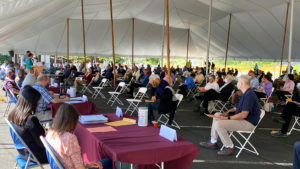
Town moderator Sarah Cannon Holden (left, in teal jacket) addresses the crowd at Lincoln’s Annual Town Meeting on May 15, 2021.
(Editor’s note: the section on the property tax circuit breaker program was updated with corrections on May 19.)
Aside from the accessory apartment issue, the 2021 Annual Town Meeting was largely free of controversy. Here are highlights of some of the measures that were approved:
Town spending
The base budget for fiscal 2022 starting in July is $42.9 million, or $44.4 million when including other articles approved at the May 15 meeting. Of that amount, $23.3 million is for the Lincoln Public Schools and $3.9 million for the town’s share of Lincoln-Sudbury Regional High School expenses.
Voters also approved $1.28 million for capital projects and $937,692 for Community Preservation Act items, as well as $1.82 million for a new public safety radio system. Those lists included two items for the school project ($410,557 for furniture and technology, and $161,200 for playgrounds) that the School Building Committee had been forced to cut from its construction budget earlier.
The Water Department budget also passed unanimously without discussion. Water Commission chair Jim Hutchinson praised new Water Department Superintendent Darin LaFalam’s “easy and calm manner with the staff and his careful and prudent handling of capital projects” and noted that there were no borrowing requests this year. The town has decided against applying to join the MWRA or building a new state-of-the-art water treatment plant, but it will revisit the issue before the next round of major capital requests in a few years, he said.
More information:
Property tax relief
Voters authorized the town to ask the state legislature for permission to allow Lincoln to implement a property tax circuit breaker program. The program would limit the property tax plus water bills to no more than 10% of the income of homeowners over 65 who have lived in town at least five years and who meet certain income and property value limits. It would be paid for by shifting up to 1% of the tax levy onto all the other property owners. Select Board member Jennifer Glass outlined the proposal to the board via Zoom on May 3.
Approximately 250 Lincoln properties could qualify for the program based on assessed value and length of ownership (the town does not have access to incomes). The Board of Assessors estimates that 30-40 households would benefit, and that the additional cost to other taxpayers could be up to about $73 in the first year, and up to about $145 in years two and three. Once approved, the local program must be reauthorized by town-wide vote every three years.
Glass noted on Saturday that a group of donors has contributed about $115,000 to a town property tax relief fund. That fund will likely be used over a five-year period to administer a circuit breaker program for homeowners under 65 who meet the other criteria. A resident asked whether the program being voted on could be funded with private funds. Glass noted the private funding does not replace the proposed circuit-breaker program. “For this to be sustained, it’s difficult to do with private funding,” she said.
Name changes
The Board of Selectmen is now the Select Board and the Council on Aging is now the Council on Aging and Human Services. Ten women have served on the board over the years, and “I’m proud to be the last Selectman elected,” board member Jennifer Glass said before the vote.
Environmental measures
Voters adopted a resolution in support of the country’s continuing participation in the Paris Climate Accord, and action by the state legislature to promote climate justice and expand the use of clean energy. “If you believe we should be bold and move fast on this climate crisis that affects everybody, I urge you to support this motion,” citizen’s petition sponsor Paul Shorb said.
The vote in favor was not unanimous, however. Resident Mike Frankston argued that the Paris Climate Accord disadvantages the United States economically. Increasing the cost of domestic manufacturing and industrial activities will shift those activities to China and other countries that pollute more, thus actually worsening the problem. “There are many unintended consequences,” said Frankston, one of two “nay” votes on the resolution.
Measures that would ban the retail sale and use of polystyrene and some other single-use food-industry plastics also passed. Voters also approved a proposal to seek state permission to require retailers to charge 10 cents for single-use paper and plastic bags (though plastic grocery bags were already banned in 2018). The charge is intended to encourage use of reusable bags and does not impose a tax, since retailers can keep the money.
Bright Light Award
Public health nurse Tricia McGean and Board of Health member Patricia Miller each received a Bright Light award for their “skillful, devoted and compassionate leadership of the town’s pandemic response efforts.”
The two were recognized for their hard work in providing public health information, helping to organize vaccine clinics for seniors, and contact tracing and follow-ups for Lincoln residents who tested positive for Covid-19. They received a standing ovation for their efforts, as did the larger Public Health Team.
Community center
Residents voted to hear a brief report on the status of the proposed community center. Select Board member Jonathan Dwyer said the town has the ability to borrow up to $27 million for capital projects including a community center once the school project is complete in 2023.
Accessory apartment issue results in razor-thin votes
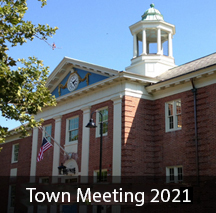 For the second year in a row, Lincoln’s Annual Town Meeting in the Covid-19 era went off without a hitch under a tent in the Hartwell school parking lot. However, though as in any town meeting, there was some controversy — at one point resulting in 87-86 vote.
For the second year in a row, Lincoln’s Annual Town Meeting in the Covid-19 era went off without a hitch under a tent in the Hartwell school parking lot. However, though as in any town meeting, there was some controversy — at one point resulting in 87-86 vote.
The subject of not one but two razor-thin votes was the town’s accessory apartment rules. The Planning Board asked residents on Saturday to approve several changes to the bylaw, which they outlined in video and Powerpoint presentations on April 27:
- Delete a section that requires the dwelling to be at least 10 years old, and remove the requirement that accessory apartments can increase the floor area of the original dwelling by no more than 10%.
- Add a cap on the number of accessory apartments equal to 5% of all residential units in town. This cap would not apply to affordable units, including those participating in the town’s Affordable Accessory Apartment program.
- Require accessory apartments leases to be for at least 30 days.
The Planning Board recommended the first change so that modestly sized homes could add a livable accessory apartment comprising more than 10% of the original floor area. The second change was intended to act as “insurance” to limit the impact on town services should the program prove highly popular. Board chair Margaret Olson noted that this can easily be revisited in the future.
But it was the third amendment that provoked the most discussion. The goal of the proposed 30-day rental minimum was to discourage homeowners from building accessory apartments for the sole purpose of renting them out to short-term tenants via Airbnb or similar services. Olson said she wasn’t aware of any cases in Lincoln that suggested the limit but “it has been an issue in other communities.”
Town Counsel Joel Bard pointed out that the 30-day rental minimum would apply only to accessory apartments and their associated principal dwellings, not to all rental units in Lincoln.
Sara Mattes proposed an amendment that would remove that proposed 30-day minimum. In the discussion that followed, John Carr said that fear of short-term rentals ”destroying the community” was moot. “This parade of one-day guests is the status quo… [the community] has already been destroyed and we didn’t notice.”
Eric Harris said the effective ban on Airbnb rentals was unfair to those who already hold permits for accessory apartments and favors those with single-family homes. Tom Sander also opposed the amendment, suggesting instead that the town limit the number of rentals per year for each accessory apartment owner.
The voice vote on the Mattes amendment was too close to call, and a standing vote resulted in a tally of 87 “no” votes vs. 86 “yes” votes. But the drama wasn’t over yet. Christoper Boit offered another amendment that would reduce the minimum rental period from 30 days to seven, which he said would allow more flexibility for short-term caregivers to come and go.
Speaking as a private citizen, Finance Committee chair Andy Payne noted that neither limit would apply to short-term accessory apartment occupants who are not paying rent. Additionally, “short-term rentals do give a number of our fellow residents an option to make Lincoln more affordable for them than it would be otherwise.”
Again, a voice vote was too close to call. In the standing vote, the Boit amendment was approved by a 89-82 margin.
Tim Christenfeld then proposed yet another amendment: removing the 5% cap on the number of accessory apartments. “This seems to run against a lot of what we’re trying to accomplish” in terms of encouraging economic diversity in town, he said. A cap signifies that “we support moderate-income families in Lincoln, but not too many.”
The current proportion of accessory apartments in town (64) is about 2–2.5% of the total number of units, Olson said. New ones are being created at the rate of two to three per year, meaning Lincoln would reach the 5% cap in about 20 years.
Christenfeld’s amendment was defeated in a voice vote where roughly two-thirds of residents voted no.
Eric Harris argued that “policy should not be based on one vote” (the margin for the first amendment) and the matter should be brought back at a future Town Meeting, but the vote on the original motion (as amended to reduce the rental period minimum from 30 days to seven) passed with only a handful of residents voting no, easily clearing the required two-thirds majority.
The Lincoln Chipmunk wants YOU!
 The Lincoln Chipmunk — the town’s online showcase for creative writing, artwork, and photos — is preparing its next issue. Everyone with a Lincoln connection is warmly encouraged to submit their work for the next issue before the deadline of May 31, 2021. You can see previous issues at chipmunk.lincolnsquirrel.com.
The Lincoln Chipmunk — the town’s online showcase for creative writing, artwork, and photos — is preparing its next issue. Everyone with a Lincoln connection is warmly encouraged to submit their work for the next issue before the deadline of May 31, 2021. You can see previous issues at chipmunk.lincolnsquirrel.com.
NEW: Send us your photo (head and shoulders) and 2-3 sentences about yourself for our new author bio feature!
Questions? Contact editor Alice Waugh at lincolnsquirrelnews@gmail.com or 617-710-5542.
Lincoln didn’t settle on road names until 1933
By Don Hafner
Before 1933, Lincoln’s road names appeared and vanished by local custom and official whim.
Consider the experience of these Lincoln residents. In 1910, according to Lincoln’s official census taker, Edward and Mary Farrar lived on the Concord and Framingham Road (today’s Route 126). In the 1920 census, they lived on Walden Street. In 1930, they resided on Farrar Road. In 1910, the town census taker listed Ellen Ehlert on Oxbow Road. In 1920, she was on Ehlert Road. In 1930, she had joined the Farrars on Farrar Road. In 1910, Euphena Hunter was Ellen Ehlert’s neighbor on Oxbow Road. In 1920, she was Ellen’s neighbor on Ehlert Road. By 1930, she was back on Oxbow Road.
The point is, none of these residents had ever moved during these 20 years. Only the names that the town’s census takers tacked onto their roads had come and gone. The 1910 census listed 24 road names in Lincoln. In the 1930 census, half of those names had vanished, replaced by a two dozen new names. Residents and the town’s census takers got into the spirit and simply invented road names.
The town knew it had a problem. In 1906, a committee was directed to report back at the next annual meeting with a recommendation on “naming the different roads of the town.” It never did. Then in 1912, the town tried again and instructed the same committee members to report back at the next annual meeting. Again, they never did. In 1915, town meeting was asked again “if the Town will take any action in reference to naming its roads.” The meeting “voted to pass over the article.” And there the matter stood for the next 17 years.
In 1932, the town tried one more time. Another committee was appointed, it returned its report later that year, and in March 1933, the town meeting accepted the committee’s recommendations for 32 names of Lincoln’s roads.
Well, almost. One last street. Renaming Station Road as Lincoln Road proved contentious. Some wanted Lincoln Road, others Lincoln Centre Road, others wanted no change at all. (No change at all? Maybe they should have called it The Lincoln Way?) So a new committee of Station Road residents was appointed to consider the matter. It only took them a year to decide that the name should be Lincoln Road. And by town vote on February 24, 1934, Lincoln finally had official road names.
“Lincoln’s History” is an occasional column by members of the Lincoln Historical Society.
My Turn: Former Selectmen endorse board’s name change
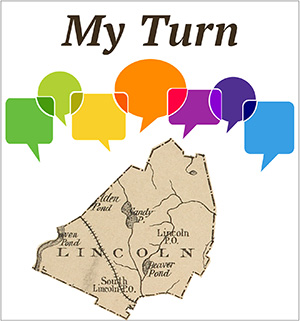 We, former members of the Lincoln Board of Selectmen, support the warrant article as written and endorsed unanimously by the current board:
We, former members of the Lincoln Board of Selectmen, support the warrant article as written and endorsed unanimously by the current board:
MOTION under ARTICLE 24
Board of Selectmen / Citizens’ Petition
Moved: That the Town vote to amend the Town’s General and Zoning Bylaws to change the name of the Board of Selectmen to the “Select Board,” by striking out, in every instance in which they appear in reference to that body, the words “Board of Selectmen” or “Selectmen” and inserting in place thereof the words “Select Board”; and by striking out, in every instance in which they appear in reference to Board members, the word “Selectman” and “Selectmen” and inserting in place thereof the words “Select Board Member” or “Select Board Members”; and further to authorize the Town Clerk to make non-substantive, ministerial revisions to ensure that gender and numerical issues in related text is revised to properly reflect such change in title; provided, however, that regardless of such nomenclature, said board shall constitute a board of selectmen for purposes of the General Laws and of any special law applicable to the Town.
Respectfully,
Penny Billings
Peter Braun
Roz Delori
Noah Eckhouse
Renel Fredriksen
Sarah Cannon Holden
John Kerr
Sara Mattes
Kathy McHugh
Peter Sugar
Beth Ries
Gary Taylor
“My Turn” is a forum for readers to offer their views on any subject of interest to other Lincolnites. Submissions must be signed with the writer’s name and street address and sent via email to lincolnsquirrelnews@gmail.com. Items will be edited for punctuation, spelling, style, etc., and will be published at the discretion of the editor. Submissions containing personal attacks, errors of fact, or other inappropriate material will not be published.
My Turn: Chapman Field is getting a makeover
By Sara Lupkas
If you’ve walked through Chapman Pasture recently, you might have seen some changes — and you’ll see seeing some smoke there on Thursday as well.
Chapman Pasture is an eight-acre field located between Silver Hill Road and Old Winter Street. Formerly grazed by livestock, it’s now primarily characterized by non-native grasses. The Lincoln Land Conservation Trust (LLCT) began a town-wide Pollinator Action Plan in 2020 with the goal of increasing pollinator habitat and biodiversity throughout Lincoln, and Chapman Pasture is one of the properties we’ve been focusing on. We recently received a grant from the U.S. Fish and Wildlife Service (USFWS) to help partially fund a restoration project on the field.
The goal of the project is to restore the native grasses and wildflowers to the meadow to create critical habitat for our native pollinator species, including threatened bees and butterflies, while maintaining the beautiful open character of the land.
LLCT has been collaborating with Dr. Robert Gegear from UMass–Dartmouth, who has been studying specific sites in Lincoln for pollinator populations, and Evan Abramson of Landscape Interactions, who drafted our Pollinator Action Plan. Earlier this spring, a USFWS contractor removed invasive plants around the edges of Chapman Pasture, and Lincoln Conservation Department and LLCT staff worked collaboratively to remove nearly 1,000 feet of linear fencing from the pasture edges.
The next step is a prescribed burn of the field to remove the non-native grasses scheduled for Thursday, May 13. With assistance from USFWS, LLCT commissioned a certified burn plan and hired a professional burn crew with expertise in prescribed burns. All activities related to the burn have been approved by USFWS, the professional burn crew from New Jersey, and the Lincoln Fire Department.
Following the burn, LLCT will undertake a replanting of the field (likely this fall) with native grasses and forbs, and then will begin a mowing and maintenance regime to encourage native plant species and to eliminate encroachment of invasive species from field edges.
We are excited about this great opportunity to develop and implement an innovative and productive long-term management plan for the field that will enhance the natural beauty and biodiversity of the field.
More information about the plan for Chapman Pasture can be found in the Lincoln Pollinator Action Plan. Within that document is this Chapman Pasture-specific toolkit.
Lupkas is the Stewardship Director for the Lincoln Land Conservation Trust.
“My Turn” is a forum for readers to offer their views on any subject of interest to other Lincolnites. Submissions must be signed with the writer’s name and street address and sent via email to lincolnsquirrelnews@gmail.com. Items will be edited for punctuation, spelling, style, etc., and will be published at the discretion of the editor. Submissions containing personal attacks, errors of fact, or other inappropriate material will not be published.
Environmental measures, name changes to go before voters on Saturday
 Voters at Saturday’s annual Town Meeting (ATM) will be asked to vote on five citizens’ petitions concerning plastics and the proposed community center, as well as two other measures seeking town board name changes.
Voters at Saturday’s annual Town Meeting (ATM) will be asked to vote on five citizens’ petitions concerning plastics and the proposed community center, as well as two other measures seeking town board name changes.
The items were originally planned for the 2020 Annual Town Meeting, but that meeting was stripped of all but essential financial items due to the Covid-19 pandemic.
Members of the L-S Environmental Club and Mothers Out Front–Lincoln made their case for three environment-related measures at the April 26 Board of Selectmen meeting.
Article 37, the Polystyrene Reduction Bylaw, would prohibit food and retail establishments in Lincoln from using or selling disposal food service containers made from polystyrene. It would also not allow sales of other items containing the substance (packing peanuts, Styrofoam coolers and coffee cups, meat and produce trays, etc.) unless the polystyrene is fully encased in a more durable material. The bylaw would not apply to prepared food or other items packaged outside Lincoln with polystyrene.
More recycling is not the answer, because polystyrene is a major contaminant in town recycling, and food-grade polystyrene manufacture requires the use of “virgin” materials, the presenters said. Particles from polystyrene and other plastics are also a health hazard for both people and animals as they degrade into microplastics and release toxins. Almost 40 other Massachusetts communities have already enacted polystyrene bans, they said.
For similar reasons, Article 39 would ban the sale and use of plastic straws, stirrers, splash sticks and other disposable plastics. Plastic straws contain toxic bisphenol-A, and all plastics release minute amounts of health-endangering chemicals into food and water.
Tricia O’Hagen of Mothers Out Front told selectmen that Donelan’s and Twisted Tree had no problem with the measures since they’re already using more environmentally friendly materials in items they sell. Under the proposed ban, food establishments may still provide disposable non-plastic items of this type if the customers request them, and customers can still bring with them and use whatever items they like. If enacted, there will be a six-month waiver to allow businesses to draw down existing inventory.
A third measure before voters, Article 38, would authorize the town to petition the state legislature to allow a local rule that would require Lincoln retailers to charge at least 10 cents for each new checkout bag of any type, including paper.
Lincoln has already enacted a ban on disposable plastic shopping bags and similar materials. However, that policy encourages people to use disposable paper bags rather than reusable bags. While paper bags are more degradable than plastic, they have their own drawbacks: the manufacturing process releases greenhouse gases and other chemicals and uses a significant amount of water.
The money to be collected is not a tax but would remain with the retailer. An easily avoidable bag charge encourages consumers to opt for non-woven polypropylene or cloth bags, which are cheaper in the long run, so the measure makes sense for both businesses and customers, the presenters said.
“We’re trying to get away from single-use items as much as possible,” O’Hagen said. Several Massachusetts cities as well as states and countries have already enacted minimum bag charges, she added.
Climate action, community center
Voters will be asked to adopt a resolution in support of the country’s continuing participation in the Paris Climate Accord, and action by the state legislature to promote climate justice and expand the use of clean energy.
In the year since the measure was originally scheduled for a vote, President Biden reversed former President Trump’s move to have the United States withdraw from the Paris Climate Accord — and Gov. Baker also signed comprehensive climate legislation.
However, the ATM vote on Article 36 is still important to signal that Lincoln will closely follow the issue to make sure deadlines in the legislation are met, while encouraging town leaders to keep working to reduce Lincoln’s carbon footprint, said Paul Shorb, one of the sponsors of the citizens’ petition. The message of a “yes” vote is to “go faster and be bold while trying to be fair to everybody,” he said.
Article 40 would require town officials to give an update on the status of a new community center for Lincoln. When the issue was most recently under discussion in 2018, town officials agreed that the school project took precedence but that Lincoln could afford further borrowing on a community center as soon as the school was finished.
In 2018, the Community Center Planning and Preliminary Design Committee submitted its final report outlining two possible design directions for the facility, which was then estimated to cost $15.3 million to $16.2 million depending on which design was chosen.
The 2018 report proposed a timeline with one date that has already passed—establishing a Community Center Building Committee starting in November 2020. The CCPPDC also proposed a March 2021 Town Meeting vote on budget and site, but the pandemic pushed it to the back burner.
The Council on Aging and the Parks and Recreation Department both have well-documented needs for more and better space, and a community center would answer those needs and would also “connect the generations in town,” said Selectman Jonathan Dwyer, the board’s liaison to the CCPPDC.
The year 2023 is “wide open for a project like this,” since the school project will be completed, and the Finance Committee says the town has additional borrowing capacity of $27 million, Dwyer said. Officials hope to discuss next steps at the fall 2021 State of the Town meeting, he added.
Name changes
Also on the ATM agenda are two other items that were discussed last year but postponed: name changes for the Council on Aging (Article 26) and the Board of Selectmen (Article 24). If voters approve, they will be called the Council on Aging and Human Services and the Select Board, respectively.
The Town Meeting starts on Saturday at 9:30 a.m. under the tent in the Hartwell School lot. For information on the articles to be voted on, see Lincoln’s Annual Town Meeting web page.
